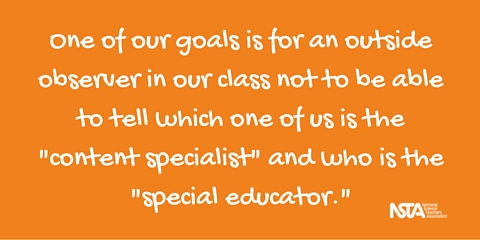Outstanding Co-Teaching Practices for Science Teachers
By Guest Blogger
Posted on 2016-03-18
Approximately 70% of students with disabilities in Virginia are spending 80% of their instructional day in the general education classroom. The most frequently used service delivery model is co-teaching. In the fall of 2014, the Virginia Department of Education launched their Excellence in Co-Teaching Initiative. The goal of the Excellence in Co-teaching Initiative is to design a professional development model of co-teaching that supports successful access to the general education curriculum for students with disabilities while recognizing outstanding co-teaching practices.
I am a Special Education teacher with endorsements in Earth and Environmental Science as well as Special Education. I have been co-teaching in a 9th grade Earth Science class for the last 8 years with the same general education teacher. Over the years, we have developed materials and teaching practices that have enabled all students to be successful in our classes and on state-mandated tests. After an application process, my co-teaching partner and I were fortunate to be selected to participate in the Co-Teaching Initiative, to serve as a co-teaching demonstration site. The demonstration sites showcase the implementation of co-teaching by promoting a collaborative model in which general and special education teachers share responsibility for the achievement of all students in the general education classroom through active co-teaching, collaboration and implementation of inclusive and research-based practices. The selected co-teaching partners assist in enhancing current co-teaching practices of others by modeling best practices in co-teaching during on-site visits, and sharing resources with others.
Co-Teaching in Earth Science has been a career-changing experience. Many school systems use the term collaboration when describing programs or classrooms where a general educator and a special educator teach together. I have been a collaborator, and I prefer to co-teach. We are fortunate that we are both certified in the subject area, and we bring our individual strengths to the classroom. We plan lessons together, and we share the responsibilities for grading and getting materials together for lessons. One of our goals is for an outside observer in our class not to be able to tell which one of us is the “content specialist” and who is the “special educator.” While I am a content specialist, I also design specialized instruction for the students in our co-taught classes who have IEPs. Our building level administration is extremely supportive of co-teaching, and provides us with a common planning time each day. In our high school, we have developed a cohort of co-teachers who are committed to utilizing co-teaching best practices in their classrooms. These practices include parallel teaching, station teaching, alternative teaching, team teaching, and one teach/one support. An example of a co-teaching lesson plan, featuring parallel teaching is attached.
Today’s guest blogger is Maribeth Lowe, M.Ed., NBCT-EN, WMHS Science and Special Education Department, Special Education Department Chair
This blog is part of a series being published by NSTA’s Special Needs Advisory board, the charge of which is to “Advise NSTA standing committees and NSTA headquarters regarding support for members with special needs and for teachers of students with special needs; make recommendations to the Executive Director and the Board of Directors regarding issues and projects related to special education.” Teresa M. Fulk is the chair of the Special Needs Advisory Board and can be contacted with questions about the work NSTA does with this community. e-mail Fulk at fulkt@gcsnc.com.
The mission of NSTA is to promote excellence and innovation in science teaching and learning for all.
Future NSTA Conferences
2016 National Conference
2016 STEM Forum & Expo
2016 Area Conferences
Follow NSTA
Disclaimer: The views expressed in this blog post are those of the author(s) and do not necessarily reflect the official position of the National Science Teaching Association (NSTA).


